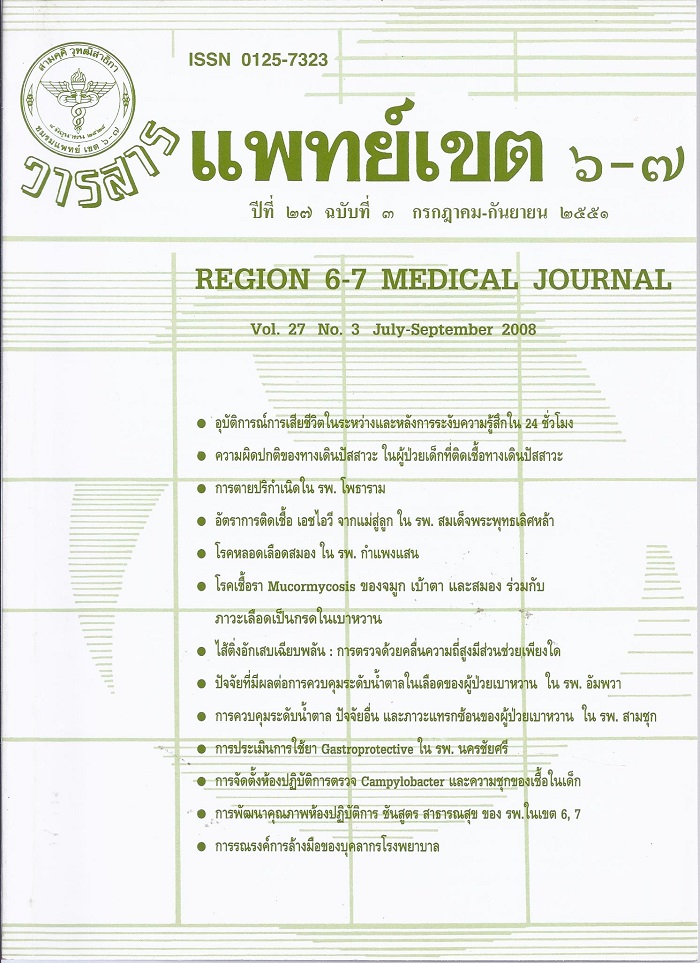การประเมินการใช้ยา Gastroprotective Drugs ในโรงพยาบาลนครชัยศรี ปี 2551
บทคัดย่อ
Non-steroidal anti-inflammatory drugs (aka NSAIDs) are, as per their excellent efficacy acceptable as the painkiller for various symptoms such as muscles and dysmennorrhea etc., widely exploited against inflammation, pain or fever. Yet, they are commonly found to set off various side effects on gastrointestinal system resulting in nausea, vomiting stomachache and gastrointestinal ulcers. So as to prevent or alleviate these side effects especially gastrointestinal ulcers, gastroprotective agents, where of the mechanism of action is to block gastric acid secretion or filming gastrointestinal tract, are currently prescribed along with NSAIDs. Hence, a retrospective study on the properness of the use of the gastroprotective agents including Omeprazole, Cimetidine and Ranitidine prescribed along with NSAIDs to the outpatients of Nakhonchaisri Hospital during 1 -31 January, 2008 were pulled off whereby 426 patient profiles of the purposively sampled subjects were reviewed.
Out of the 426 sampled patients, it was found that 63.6% were female, 59.4% or 253 patients were under 65 years of age. Additionally, Diclofenac was prescribed to 232 patients or 54.46% whereas Aspirin was prescribed to 138 patients or 32.40%. The prescriptions of the combination of Aspirin and Diclofenac were handed out to 39 patients or 9.15% whereas the prescriptions of the combination of Aspirin and Piroxicam were handed out to 5 patients or 1.17%.
Based on the five risk factors inducing gastrointestinal ulcers, 327 patients (76.76%) were found to be at risk of having gastrointestinal ulcers therein 194 patients (59.33%) persistently received NSAIDs and 173 patients aged over 65 years. It was also found that, 99 patients (23.24%) received gastroprotective agents despite the fact that they were at no risk of having ulcers.
Of all the three gastroprotective agents, the prescriptions of Omeprazole, Cimetidine and Ranitidine were 83.79%, 10.40% and 5.81% respectively. Omeprazole were properly prescribed at 20 mg/day whereas the other two H2 blockers were precribed at the improper doses. Somehow, these two H2 blockers were seemingly prescribed as the antiallergic agents rather the gastroprotective agents.
The evaluation of drug use will help promote the effectiveness and quality of patient care, reduce risk from unnecessary use of drug and public expenditure on healthcare.
ดาวน์โหลด
เผยแพร่แล้ว
รูปแบบการอ้างอิง
ฉบับ
ประเภทบทความ
สัญญาอนุญาต
ลิขสิทธิ์บทความเป็นของผู้เขียนบทความ แต่หากผลงานของท่านได้รับการพิจารณาตีพิมพ์ลงวารสารแพทย์เขต 4-5 จะคงไว้ซึ่งสิทธิ์ในการตีพิมพ์ครั้งแรกด้วยเหตุที่บทความจะปรากฎในวารสารที่เข้าถึงได้ จึงอนุญาตให้นำบทความในวารสารไปใช้ประโยชน์ได้ในเชิงวิชาการโดยจำเป็นต้องมีการอ้างอิงถึงชื่อวารสารอย่างถูกต้อง แต่ไม่อนุญาตให้นำไปใช้ในเชิงพาณิชย์




